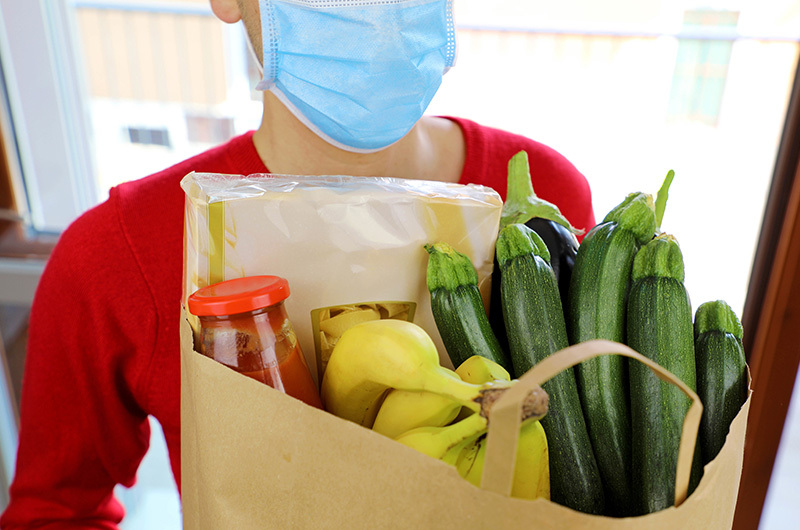Taking care of our community during COVID-19 and beyond

Although COVID-19 has affected the health of most children less acutely than adults, many young people who live in the communities surrounding Boston Children’s Hospital are experiencing the virus’s impact in other troubling ways as their families struggle with food insecurity and are having trouble meeting many other basic needs.
“Right now, there’s been a shift in lifestyle and a disruption in routines for everyone. Parents, grandparents, or other caregivers have been laid off or may be sick, and children are trying to do schoolwork from home. It’s also more difficult to access resources and support due to reduced income and food and supply shortages,” says Dr. Shari Nethersole, executive director for community health and the Office of Community Health at Boston Children’s.
Identifying growing community needs
While this begins to paint a picture of the current situation, it’s important to know that Boston Children’s Primary Care at Longwood and Martha Eliot are receiving an influx of requests from parents and other caregivers for help with housing, food, transportation, and utilities — with families reporting significant need for food, diapers, and other types of support.
With approximately 22,000 patients served across both of these facilities, about 70 percent of them are insured through Medicaid. This indicates a high degree of socio-economic vulnerability even in the best of times, Dr. Nethersole stresses. Now with the coronavirus crisis, these needs are amplified.
Other health centers are also seeing a similar impact. For example, one health center the Office of Community Health works with has reported that requests for these items has more than doubled since the crisis began, going from 30 to 50 requests for help per week pre-COVID to as many as 100 a week today.Other groups are also facing similar increases in needs among families they serve.
Partnering to help children and families
The Office of Community Health is working to support these children and their families on many levels. In collaboration with Boston Children’s Primary Care Center, Martha Eliot, and community health centers, the Office of Community Health is making sure that parents and other caregivers have access to food and other essentials. The team is also in close contact with its many partners who are connected to the hospital and through its Collaboration for Community Health. All of these groups are focused on supporting the urgent needs of families and others caring for kids during the COVID-19 crisis.
“We are supporting emergency relief efforts for families and have redirected some funds to help provide parents and other caregivers with short-term financial assistance for emergency childcare, rent, or utilities, as well as with gift cards or food to be distributed through primary care sites and at community health centers,” says Dr. Nethersole. “Another important role that Boston Children’s can play is to connect these families with other organizations and resources in their own neighborhoods,” she adds.
Supporting community relief efforts now and in the future
Because the impact of the current outbreak will have a long-lasting effect on many children’s health and well-being, the Office of Community Health is not only determining how to meet the growing needs that exist today, but is also looking toward tomorrow for ways to continue the momentum over the longer term.
In addition to trying to meet these immediate needs, the Office of Community Health wants to understand which systems are working and which might need to change to build up resiliency in communities. This will help families over the long term as they adapt to a new “normal” after the COVID-19 pandemic.
“As we assess the needs, we are also always looking for opportunities,” Dr. Nethersole says. “For example, our primary care practices and community health centers have been implementing telehealth visits and we expect that to continue and make care more accessible for families.”
She adds that she and colleagues are also working with the Office of Government Relations to ensure the most effective policies are in place to protect children at the state and federal levels — both now and moving forward.
Get more answers about Boston Children’s response to COVID-19 and the community resources available.
Related Posts :
-

Model enables study of age-specific responses to COVID mRNA vaccines in a dish
mRNA vaccines clearly saved lives during the COVID-19 pandemic, but several studies suggest that older people had a somewhat reduced ...
-

Making pediatric health equity research truly equitable: An EDI review process
A burgeoning number of studies are examining pediatric health equity, diversity, and inclusion (EDI). But if not done right, health ...
-

New insight into the effects of PPIs in children
Proton-pump inhibitors (PPIs) are frequently prescribed to suppress stomach acid in patients with gastroesophageal reflux disease (GERD). Prescribing rates of ...
-

Creating the next generation of mRNA vaccines
During the COVID-19 pandemic, mRNA vaccines came to the rescue, developed in record time and saving lives worldwide. Researchers in ...





